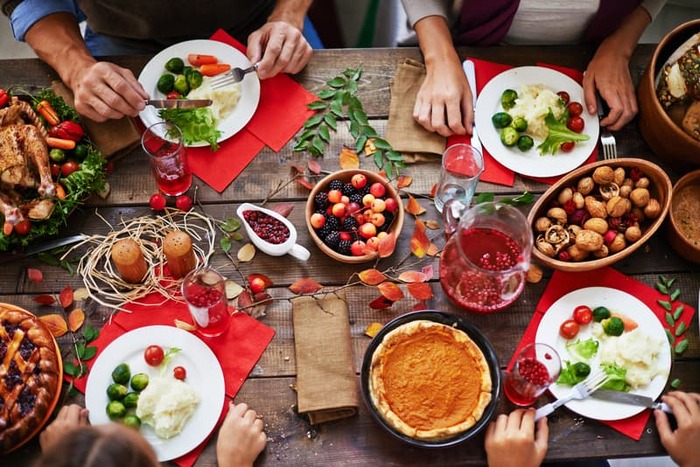- Calls to this hotline are currently being directed to Within Health or Eating Disorder Solutions
- Representatives are standing by 24/7 to help answer your questions
- All calls are confidential and HIPAA compliant
- There is no obligation or cost to call
- Eating Disorder Hope does not receive any commissions or fees dependent upon which provider you select
- Additional treatment providers are located on our directory or samhsa.gov
How to Avoid Eating Disorder Relapse During Thanksgiving

Contributor: Staff at Timberline Knolls Residential Treatment Center
With apologies to candy at Halloween and Easter, there’s no holiday we tend to associate more with food — sweet, savory, and everything in between — as its defining characteristic than Thanksgiving.
Drop in on any random Thanksgiving dinner, and you’re likely to find some combination of turkey, mashed potatoes and gravy, green bean casserole, stuffing, cranberry sauce, and pumpkin pie, along with the many other regional and family-specific specialties we’ve come to expect on our plates on the fourth Thursday in November.
For people who are in recovery from an eating disorder, gathering around a table of loved ones with such a strong focus on food can be incredibly challenging. Instead of focusing on the joy of the season, rekindling old traditions, and spending time with those who matter most in their lives, they may experience a much different emotion: overwhelming stress.
The beginning of the holiday season can be even more stressful given the pandemic. A study conducted by the International Journal of Eating Disorders last year found that, for those who are struggling with anorexia, bulimia, and binge-eating disorder, symptoms worsened after lockdown began in March 2020 [1].
Plotting out strategies to stay in recovery
For anyone who is in recovery from an eating disorder or currently in treatment, one of the most important things to do is be prepared for potential hurdles that are on the horizon.
The holidays are often a major obstacle, and that tends to begin with Thanksgiving. The idea of interacting with relatives or acquaintances who may not understand what you’ve been experiencing can be scary. The same goes for those who are familiar with disordered eating, which can leave you fearful of a potential judgment or comment that may upset you.
Advertisement
Call Timberline Knolls for Help 888-206-1175
Add in the realities of the pandemic, and, suddenly, an often tricky situation becomes even more complicated. Concerns about the vaccination status of loved ones — or their opinions on the matter — and navigating shared spaces during a time when the weather often calls us all indoors are realities everyone now has to face.
If we think of Thanksgiving as the first in a series of potentially problematic holiday obligations, it’s crucial to go in with a plan that can work for you. That way, you can ensure that you’re not just staying in recovery with 2022 around the corner, but that you’re thriving.
Here are five tips that can help you thrive as Thanksgiving approaches:
-
Have foods ready for when you’re out of the house.
If you’re preparing to travel for Thanksgiving, whether it involves heading to an airport or just hopping in the car, make sure to pack foods you’re comfortable with. By packing accessible snacks, you can feel good about your choices and avoid having to rely on unreliable options during your trip.
-
Communicate with your support system.
Don’t be afraid to reach out to those who helped you during eating disorder treatment, whether it’s a therapist, dietitian, or someone else, so that they can provide you with positive reminders heading into Thanksgiving and the rest of the holiday season. But also make sure that you identify at least one family member or friend who will be attending the same gatherings to lean on. Let them know what you need to feel comfortable, and they’ll be able to help set you up for success — or pull you out of a potentially difficult situation.
-
Politely prepare to redirect awkward conversations.
Having a supportive friend or relative in your corner will help, but you can’t script every conversation. For some people who struggle with an eating disorder, issuing a blanket statement about what’s off limits for discussion at the beginning of a gathering to avoid any awkward interactions may be the right move. But for others who would rather not discuss their recovery or food-related topics, it’s best to be prepared to steer conversations in different directions. If a nosy relative begins talking about food in a way that makes you uncomfortable, compliment something they’re wearing, discuss the weather or beautiful décor at your party, or ask about something that’s going on in their life. You don’t need to be rude, but you can set the boundaries that make you the most comfortable.
-
Steer clear of potential social media triggers.
Even if you’ve largely cut out triggering diet sites, fitness gurus, or weight loss programs from your online world, images that can lead to insecure feelings may be hard to avoid at Thanksgiving. If you see something that unsettles you, don’t be afraid to block or unfollow. If there are too many to count, perhaps a break from social media can qualify as an early New Year’s resolution.
-
Try to enjoy yourself.
There’s no doubt that Thanksgiving can be a particularly difficult occasion for someone who is in recovery from an eating disorder, and the complications of the pandemic may only exacerbate the hang-ups you have around this holiday.
But Thanksgiving doesn’t have to be a time to dread. By taking steps to prepare yourself for potentially uncomfortable situations, you can have a plan that will help put you at ease. Try to spend time with the friends and family members who are most supportive of you in your recovery, and you may even discover others you can count on in your circle of trust.
References:
[1] Termorshuizen, J., Watson, H., Thornton, L., Borg, S., Flatt, R., MacDermod, C., Harper, L., van Furth, E., Peat, C., & Bulik, C. (2020, July 28). Early impact of COVID-19 on individuals with self-reported eating disorders. A survey of ~1,000 individuals in the United States and the Netherlands. Int J Eat Disord. 53(11); 1780-1790. https://doi.org/10.1002/eat.23353.About Timberline Knolls

Timberline Knolls is a residential treatment center located on 43 beautiful acres just outside Chicago, offering a nurturing recovery environment for women and girls age 12 and older who are struggling with eating disorders, addiction, trauma, and co-occurring mental health conditions. An adult partial hospitalization program (PHP) is available for step-down and for women to directly admit. By serving with uncompromising care, relentless compassion, and an unconditional joyful spirit, we help our residents and clients help themselves in their recovery. For more information, please visit www.timberlineknolls.com.
The opinions and views of our guest contributors are shared to provide a broad perspective of eating disorders. These are not necessarily the views of Eating Disorder Hope, but an effort to offer a discussion of various issues by different concerned individuals.
We at Eating Disorder Hope understand that eating disorders result from a combination of environmental and genetic factors. If you or a loved one are suffering from an eating disorder, please know that there is hope for you, and seek immediate professional help.
Published on November 11, 2021. Published on EatingDisorderHope.com
Reviewed & Approved on November 11, 2021 by Jacquelyn Ekern, MS, LPC

